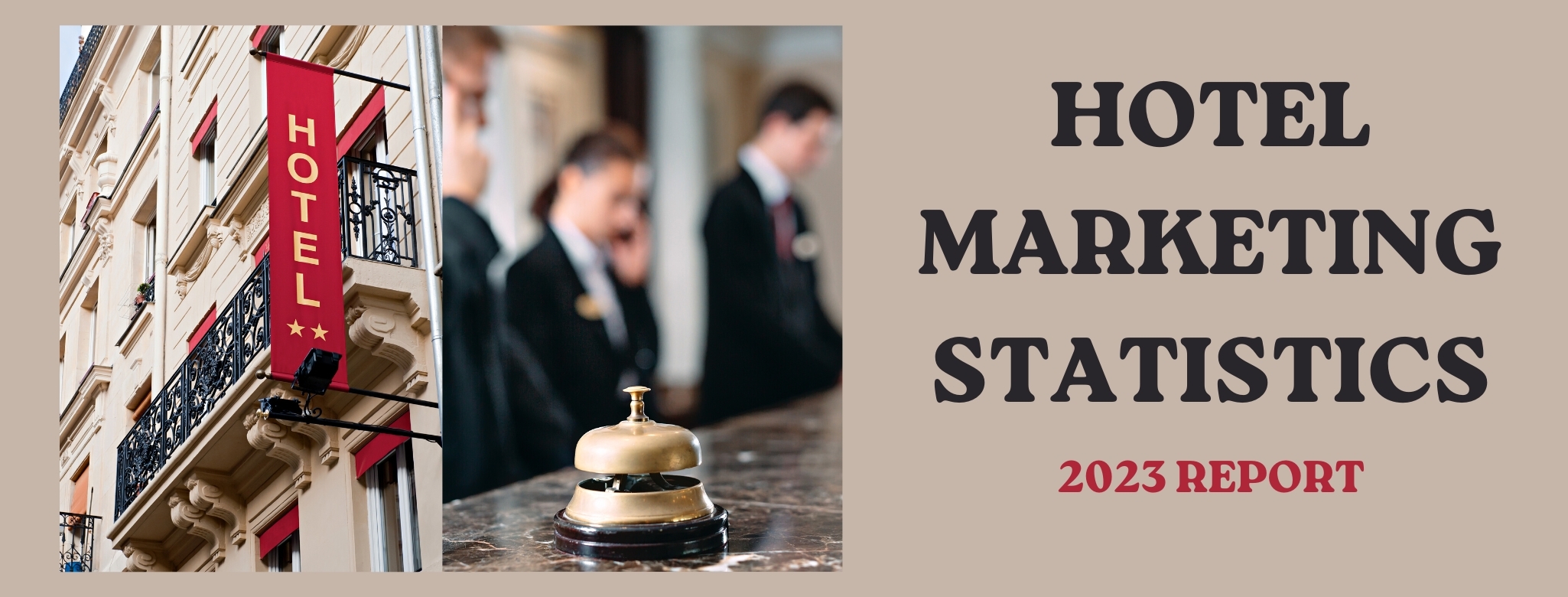
02 Jun HOTEL MARKETING STATISTICS IN 2023
Hotel marketing landscape is expanding rapidly as more travelers use the internet and social media to research and choose their next vacation. According to TripAdvisor, hotels with better content strategy, branding, and more images and videos tend to outperform those with less visual elements and branding. TripAdvisor hotel profiles with higher amount of hotel property images and videos saw a 138% increase in engagement and were 225% more likely to receive a booking inquiry. Search engine rankings and digital advertising may also play a large part in the hotel discovery as reports show that online bookings make up almost 60% of all hotel bookings. Social media may also play a crucial role about the brand discovery as 55% of consumers liked a hotel’s page on Facebook in order to receive more information about the property.
Below, we have composed of 15 most crucial hotel marketing statistics for 2023:
Hotel Marketing Statistics (Editors Choice)
- Properties with at least one photo see a 138% increase in engagement and are 225% more likely to receive a booking inquiry
- 55% of users have liked a hotel’s page on Facebook in order to get information about the hotel
- Online bookings make up almost 60% of all hotel bookings
- 40% of hotel guests are likely to write a review after a positive experience and 48% of guests would do the same after a negative experience
- Hotels that have a significant number of high-quality photos on their websites see a 15% increase in conversion rates
- 76% of people post their vacation photos to Facebook and other social media
- Websites with videos are 53 times more likely to appear on the first page of Google search results when compared to websites with no videos
Hotel Marketing: 15 Top Hotel Marketing Statistics in 2023!
Hotel marketing statistics #1: properties with at least one photo see a 138% increase in engagement and are 225% more likely to receive a booking inquiry
Hotel guests are increasingly relying on photos when making their reservations. In fact, studies have shown that properties with at least one photo see a 138% increase in engagement and are 225% more likely to receive a booking inquiry. And those with over 100 photos see an even greater increase in engagement, with 151% more engagement and 283% more booking inquiries.
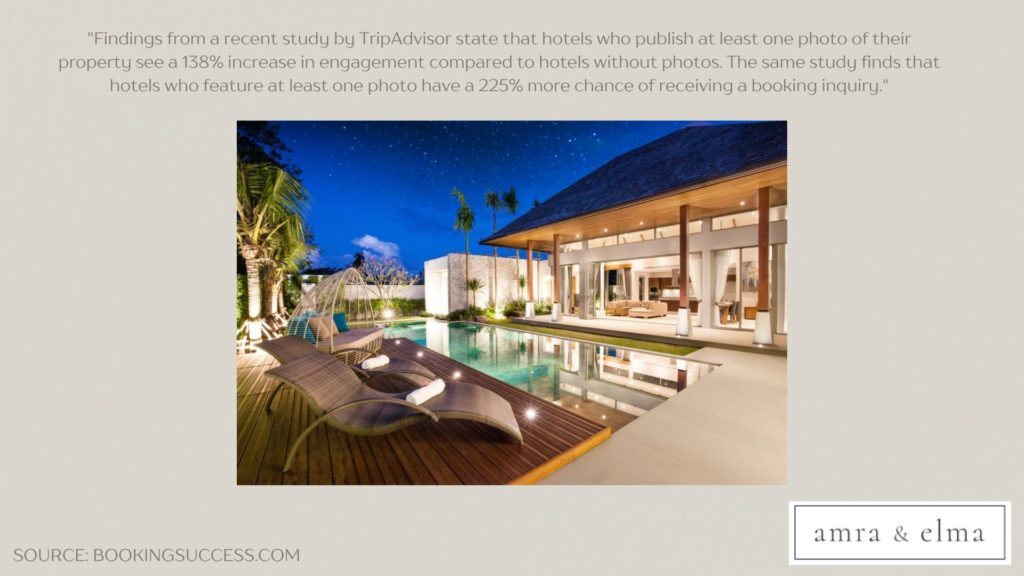
Hotel marketing statistics #2: hotels that have a significant number of high-quality photos on their websites see a 15% increase in conversion rates
According to a study, hotels that have a significant number of high-quality photos on their websites see a 15% increase in conversion rates. In other words, for every 100 hotel website visitors, 15 of them will book a room if the hotel has quality photos on its site. This statistic underscores the importance of high-quality photography in hotel marketing. A hotel’s website is often the first point of contact between the hotel and potential guests, so it is essential that the site makes a good impression. High-quality photos are one way to do this. They can show potential guests what the hotel has to offer and give them a sense of what their stay would be like.
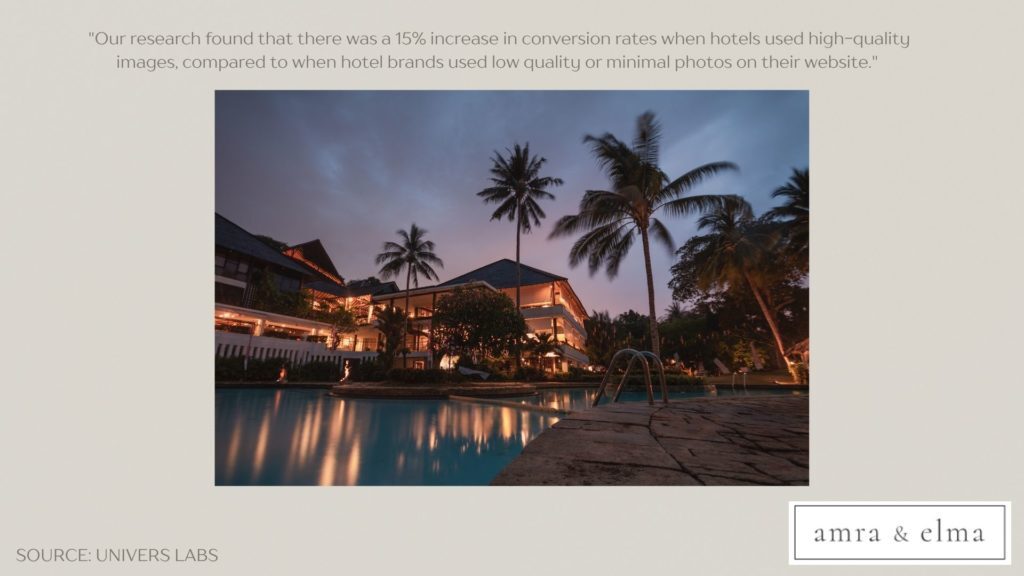
Hotel marketing statistics #3: the number of photos a hotel has on its TripAdvisor profile has the most impact on traveler engagement with the listing
According to hotel marketing statistics from TripAdvisor, the number of photos a hotel has on its TripAdvisor profile has the most impact on traveler engagement with the listing. This means that hotels with more photos are more likely to capture the attention of potential guests and generate bookings. In addition to quantity, the quality of the photos is also important. High-resolution photos that showcase the hotel’s facilities and services in a positive light are more likely to engage travelers and encourage them to book a stay.
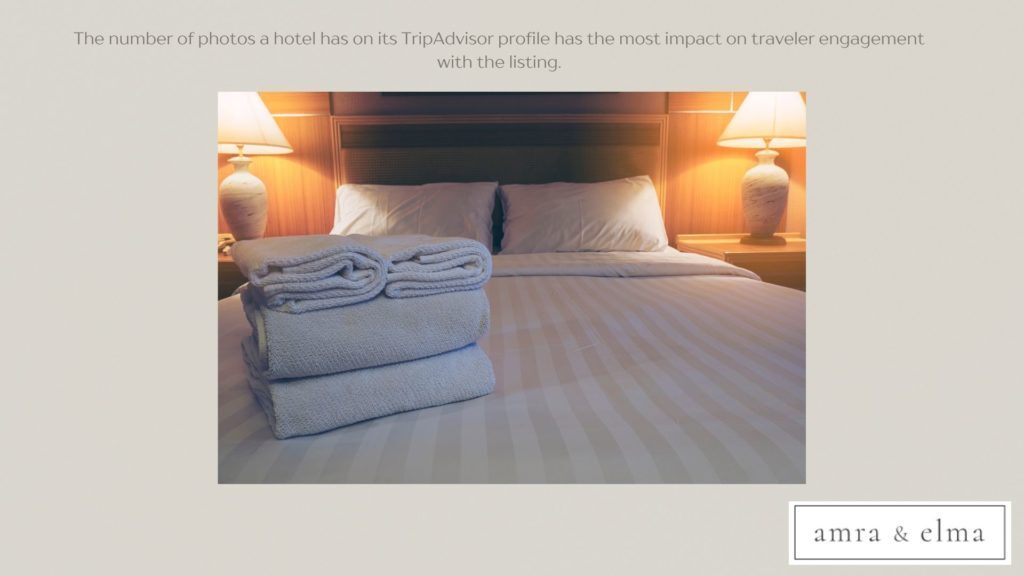
Hotel marketing statistics #4: the growth rate of the hotel industry was 19.1% in 2020-2021
There is no doubt that the hotel industry has been through a tough few years. The COVID-19 pandemic led to widespread lockdowns and travel bans, which had a devastating effect on hotel revenues. However, there are signs that the hotel industry is beginning to recover. The growth rate of the hotel industry was 19.1% in 2020-2021, as hotels reopened after the lockdowns. This is an unusually high growth rate, but the industry is expected to continue to grow from 2021 to 2025, at a slower CAGR of 7%.
Hotel marketing statistics #5: online bookings make up almost 60% of all hotel booking
Hotel marketing efforts are shifting to digital channels as reports show that online bookings make up almost 60% of all hotel bookings. Half of those who book hotel rooms digitally do so from a mobile device, making mobile optimization an essential part of any hotel’s digital marketing strategy. Hotels are investing more in online and mobile advertising, SEO, and other digital marketing tactics to reach travelers who are increasingly using the internet to research and book their hotel stays.
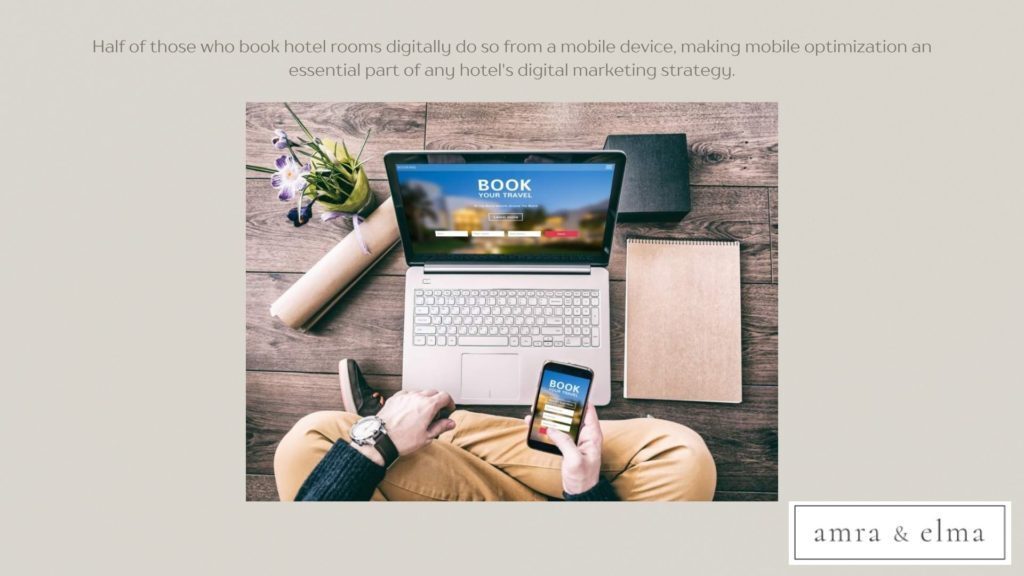
Research shows that hoteliers should focus on Facebook to market their hotel to social media users. Of social media users, 52% said their friends’ photos inspired travel plans. For hoteliers, this stat should inspire them to focus on Facebook as a hotel marketing platform because of the high organic reach potential. The key is to create content that is visually appealing and includes a call-to-action. Additionally, hoteliers should use relevant hashtags to make their hotel more discoverable on social media.
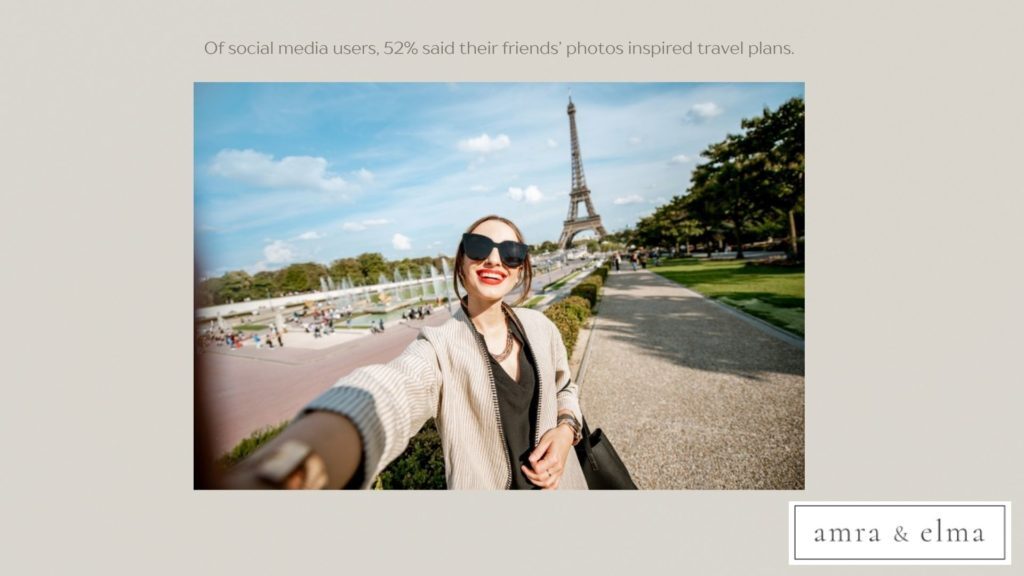
Hotel marketing statistics #7: 55% of users have liked a hotel’s page on Facebook in order to get information about the hotel
A recent study found that hotel guests are increasingly using Facebook to research and plan their trips. The study, which polled 2,000 hotel guests, found that 55% had liked a hotel’s page on Facebook in order to get information about the hotel or the area they were visiting. This is a significant increase from previous years, when only 33% of hotel guests said they used Facebook for trip planning purposes. The study also found that hotel guests are more likely to book a room if they can find positive reviews on Facebook.
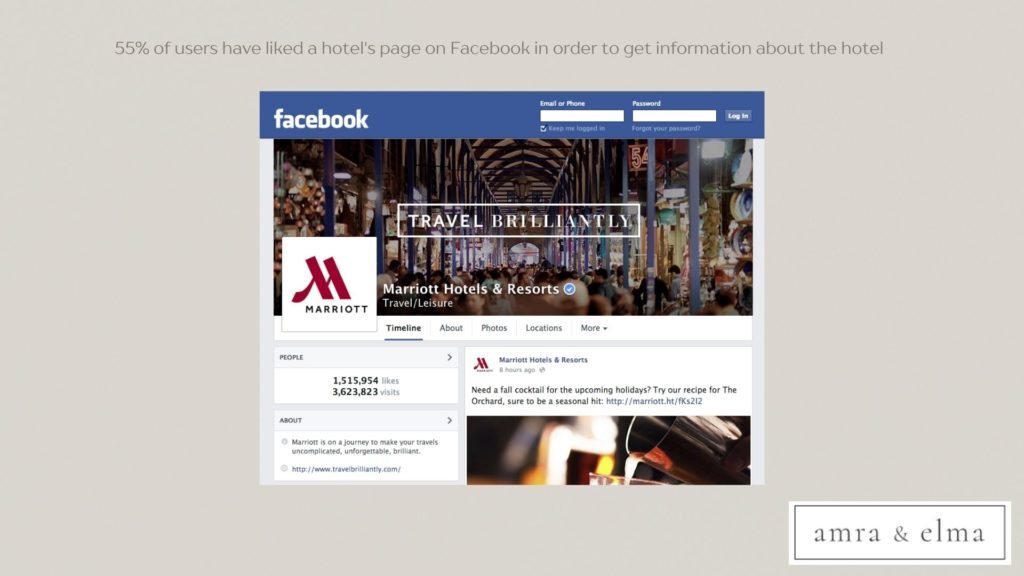
A study by hotel marketing firm MMGY Global found that 76% of people post their vacation photos to Facebook and other social media. The study also found that people are more likely to post photos of their hotel room than any other location. By encouraging guests to share photos of their stay, hotels can reach a wider audience and generate positive word-of-mouth. In addition, hotel staff can use these photos to identify areas that need improvement.
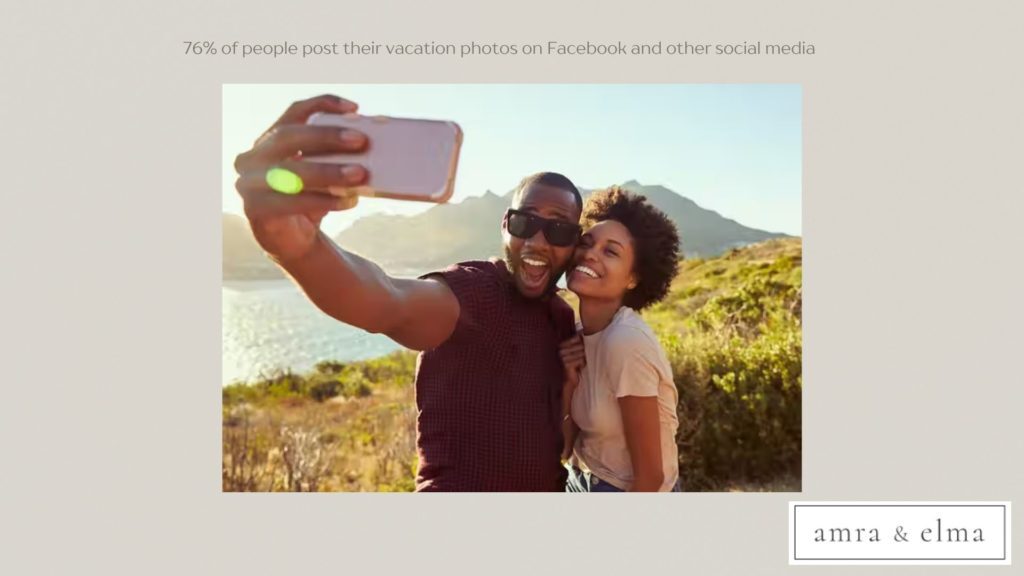
Hotel marketing statistics #9: 69% of ads on Facebook use images while 18% of ads use video
In hotel marketing, it is important to know which visual elements will be most effective in grabbing attention and conveying information. According to recent data, 69% of ads on Facebook use images while 18% of ads use video. This trend is likely due to the fact that images and videos are more engaging than text-based messages. They are also more likely to be shared on social media, which can help to reach a wider audience.
Hotel marketing statistics #10: websites with videos are 53 times more likely to appear on the first page of Google search results
Any hotel looking to market themselves online knows that appearing on the first page of Google search results is essential. After all, studies have shown that 75% of users never scroll past the first page of results. But what many hoteliers don’t realize is that adding a video to their website can dramatically increase their chances of appearing on the first page. In fact, a Forrester study found that websites with videos are 53 times more likely to appear on the first page of Google search results. This is likely due to the fact that videos are highly engaging and often lead to longer website visits.
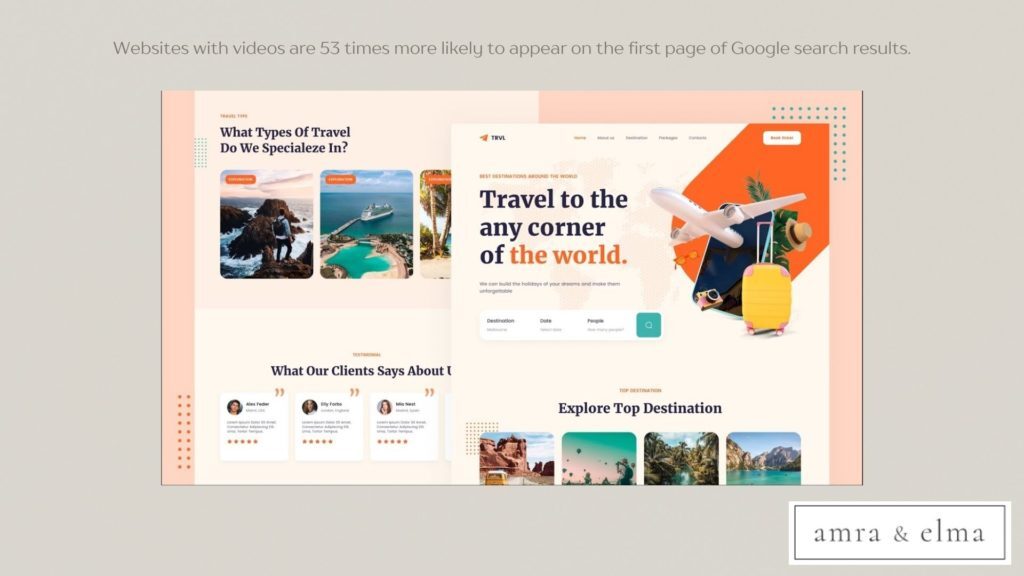
Hotel marketing statistics #11: 81% of travelers always or often read reviews before booking their accommodations
The hotel industry is increasingly relying on online reviews to market its accommodations. A study by SiteMinder found that 81% of travelers always or often read reviews before booking their accommodations. This trend is driven by the increasing popularity of trip-planning websites and apps, which make it easy for travelers to compare hotel options and read reviews from other guests.
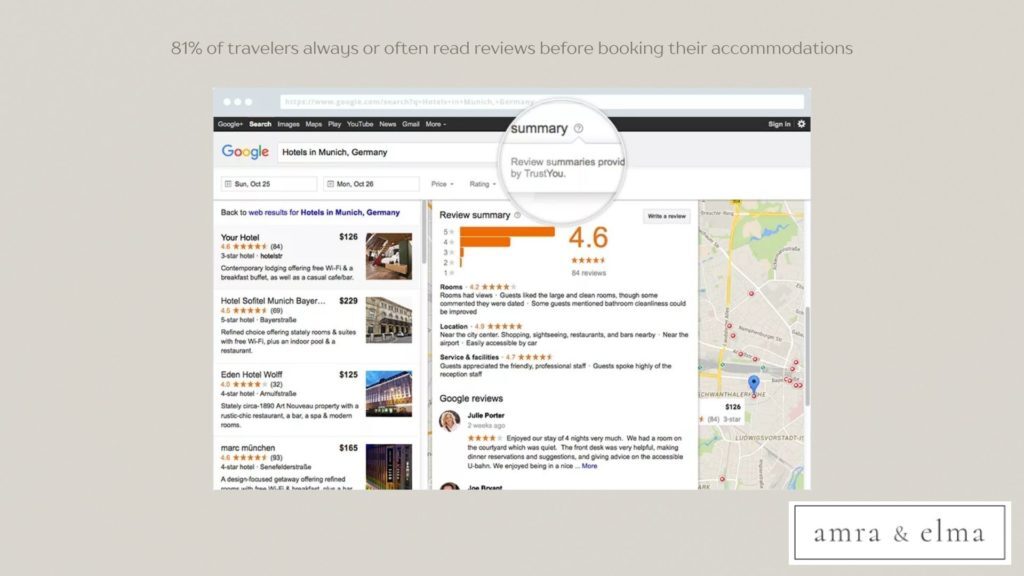
Hotel marketing statistics #12: 40% of hotel guests are likely to write a review after a positive experience and 48% of guests would do the same after a negative experience
Reviews are an important part of hotel marketing. Not only do they provide valuable feedback for hotel staff, but they also influence the decision-making of potential guests. According to ReviewTrackers, 40% of hotel guests are likely to write a review after a positive experience. This number jumps to 48% after a negative experience. These reviews can be posted on hotel websites, travel booking sites, and social media platforms.
Hotel marketing statistics #13: 61% of travelers reported that the pandemic has inspired them to travel more sustainably and 81% of travelers said that they would stay in sustainable accommodations in the next year
As the world slowly starts to reopen after a year of lockdowns and travel restrictions, many people are beginning to think about their next vacation. And, according to Booking.com’s annual Sustainable Travel Report, sustainability is top of mind for many travelers. In the 2021 release of the report, 61% of travelers reported that the pandemic has inspired them to travel more sustainably. Furthermore, 81% of travelers said that they wanted to stay in sustainable accommodations in the next year.
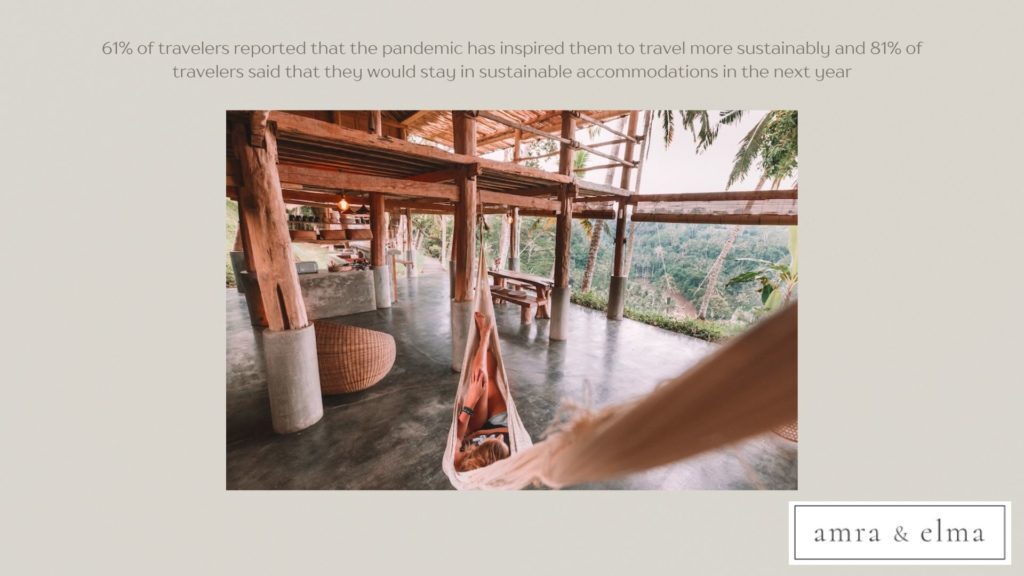
Hotel marketing statistics #14: bookings are 67% more likely to happen when there is a video tour available
As hotel marketing continues to evolve, video tours are becoming an increasingly popular way to showcase properties. And there’s a good reason for this – according to recent studies, bookings are 67% more likely to happen when there is a video tour available. Video tours offer potential guests a comprehensive look at what your hotel has to offer, and they can be easily shared across social media and other platforms. Importantly, they also give guests a sense of the hotel’s atmosphere and style.
Hotel marketing statistics #15: travelers make on average 38 visits to travel websites before making a hotel booking
With hotel bookings becoming increasingly digital, it’s more important than ever for hotel marketers to understand how travelers are making their decisions. According to a 2015 survey by Expedia, travelers make on average 38 visits to travel websites before making a hotel booking. In addition, the survey found that price was the most important factor for travelers when making a hotel booking, followed by location and then reviews.
The future of the hotel marketing
These travel marketing statistics are important to consider when planning a digital marketing strategy. By understanding how users interact with content and using the latest technology, there’s a chance to increase bookings and create a better user experience. Videos are an essential part of any online marketing strategy, and social media is still one of the most powerful tools at disposal.
What Is a Hotel Marketing Strategy and Why Is It So Important?
A hotel marketing strategy must take into account the unique needs and characteristics of the hotel industry. There are a variety of marketing channels that hotels can use to reach their target consumers, each with its advantages and disadvantages.
One common hotel marketing strategy is online advertising. This can involve paid search engine marketing (SEM), paid social media advertising, or display advertising. SEM involves paying for the placement of ads on search engines such as Google and Yahoo!; hoteliers can target potential guests by location, price range, and other factors. Paid social media advertising, as the most relevant part of any hotel marketing strategy, allows hotels to place ads on social media platforms such as Facebook and Twitter, where they can target consumers based on interests, demographics, and other factors. Display advertising involves displaying banner ads on websites outside of the search engine and social media platforms.
Another common hotel marketing strategy is public relations (PR). PR can involve generating positive news stories about the hotel or issuing press releases about new features or promotions. With the help of this hotel marketing strategy, hoteliers can also work with travel journalists to write articles about their properties. PR can be an effective way to reach potential guests who are already familiar with the hotel’s brand or who are looking for specific types of accommodations.
Third-party booking websites such as Expedia and TripAdvisor are also important channels for hotels to consider and present one of the most important parts of any hotel marketing strategy or campaign. These websites allow travelers to compare prices and reviews from multiple hotels in a given destination, making it easier for them to choose the right property. With this hotel marketing strategy, hotels can increase their visibility on these websites by submitting their information to be included in their databases and by running paid advertising campaigns.
Finally, many hotels also use direct mail campaigns as an effective hotel marketing strategy, to reach potential guests. This can involve mailing brochures, postcards, or other materials directly to consumers or sending them electronically via email or text message. Direct mail can be an effective hotel marketing strategy to reach consumers who are not already familiar with the hotel’s brand or who are looking for specific types of accommodations.
When it comes to marketing a hotel, an effective hotel marketing strategy is key. There are many different ways to market a hotel, and the most effective hotel marketing strategy depends on the specific hotel and its target market. However, some general principles apply to all hotels.
One of the most important parts of any hotel marketing strategy is visibility. Potential guests need to be aware of your hotel’s existence to consider staying there. There are many ways to achieve visibility, including advertising, PR, and online marketing.
Another important factor of any hotel marketing strategy is creating a strong branding presence. Guests need to feel like they can trust your hotel and be confident that they will have a good experience. This means developing a strong logo, slogan, and overall brand identity. You also need to make sure that your website looks professional and trustworthy. Customer service is another critical element of any hotel marketing strategy. It’s important to make sure that your staff is friendly and helpful, and that they can meet the needs of guests. You also need to make sure that your facilities are clean and up-to-date.
Overall, it’s important to have a well-rounded hotel marketing strategy if you want your hotel to be successful. The key is to identify your target market and then tailor your marketing efforts accordingly. If you can create a strong brand identity and provide good customer service, you’ll be well on your way to success.

